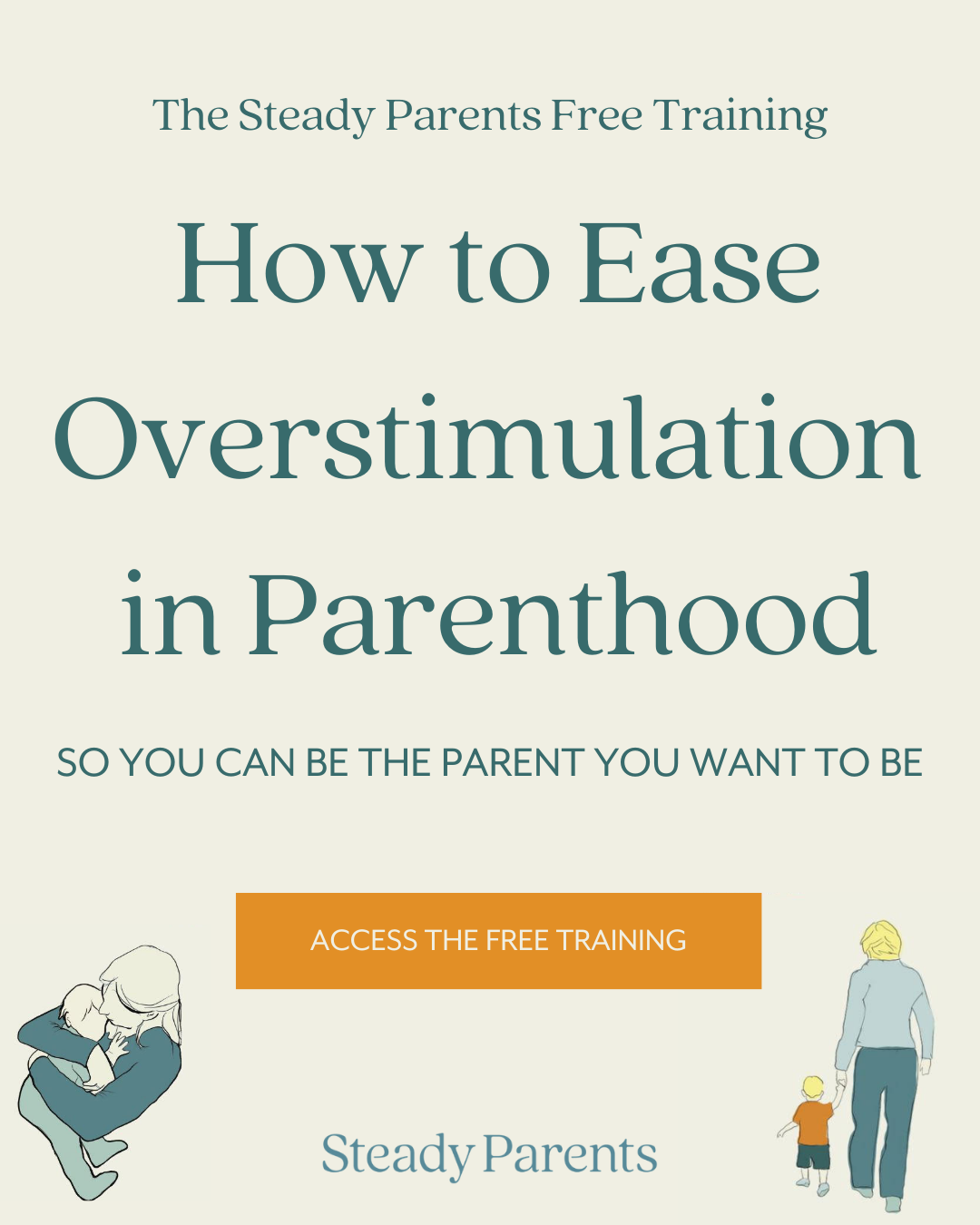10 Surprising Symptoms of Overstimulation and How to Cope
As a parent, it's common to experience moments of overstimulation, especially when juggling the demands of parenting, household responsibilities, work, and more.
Anyone else get surprised by the things that make them SNAP?! And then the noises that erupt immediately after?!
It’s not you, it’s your nervous system!
Pre-kids, your nervous system likely could manage day-to-day tasks pretty easily, and could filter out unimportant stimuli (like crumbs on the floor) without you even realizing it.
But post-kids, your nervous system has a LOT more to deal with!
More noise, more touch, more things to do, more schedules to manage, more risk analyses, everything is just more, more, more! With very little opportunity to release that nervous system from go-mode.
Recognizing when you are overstimulated is essential to maintaining your well-being and effectively managing your responsibilities.
“Post-kids, your nervous system has a LOT more to deal with”
How Do I Know If I’m Overstimulated?
Parenting is tough work so recognizing some signs and indicators that you are entering overstimulated mode can help you break the cycle and parent in a way that is more in alignment with you. These may include:
Feeling Irritable or Anxious
If you find yourself becoming easily irritable, anxious, or impatient, it could be a sign of overstimulation. Small annoyances or disruptions that you might typically handle calmly can become overwhelming.
Physical Symptoms
Overstimulation can manifest as physical symptoms such as headaches, muscle tension, racing heart, or feeling physically drained. Pay attention to how your body responds to stress.
Difficulty Focusing
Overstimulation can make it challenging to concentrate or complete tasks. You may find it difficult to focus on one thing at a time or feel scattered.
Sensory Sensitivities
Heightened sensitivity to sensory stimuli, such as noise, light, or touch, can be a sign of overstimulation. You might become easily bothered by loud noises, bright lights, or even physical contact.
You know when your kids spill their blueberries all over the floor, you step in one and that slimy feeling on your feet just sends you over the edge? Yeah, that’s overstimulation at its finest.
On days when I’m feeling especially sensitive, I take the kids outside for their meals, that way I don’t have to worry about cleaning up their mess.
Emotional Reactions
Overstimulation can lead to emotional reactions like crying, frustration, or even outbursts. You may feel overwhelmed by your emotions and struggle to regulate them.
In these moments, it may not feel possible to step away from the chaos to gather yourself, but that is the best thing you can do.
Even if you can’t leave the room without your kids following you down the hall, pressing your back up against the wall and taking a few nice deep breaths can help you to reset your nervous system and regain your composure.
Fatigue
Overstimulation can be mentally and physically exhausting. If you're feeling unusually tired or drained, it might be a sign that you're overwhelmed by the demands of parenthood.
Difficulty Sleeping
Overstimulation can make it challenging to relax and fall asleep, even when you're physically exhausted. Your mind may continue to race with thoughts and worries.
This is especially noticeable when you go to lay down for bed at the end of a tiring day and you find you can’t shut your mind off.
Insomnia is a common symptom of overstimulation but establishing a sleep routine that allows your body to get out of flight or fight mode and into a relaxed state can help.
Be sure to check out my blog post: Stress and Sleep: Why You Can’t Sleep Even Though You’re Exhausted and my Reclaim Your Sleep Masterclass for more guidance.
Desire for Solitude
A strong desire to withdraw, be alone, or escape from the situation may indicate that you need a break to recharge and regain your composure.
Your kids might be having a blast singing and dancing in the next room but inside you just want to scream!
Can you imagine how fun it would be to watch them dancing and singing around in the living room, and actually join in? Or even just watch and soak it in, instead of biting your tongue to keep from yelling?
You have to find ways to care for yourself so you can more meaningfully engage in the joy with them.
Restlessness or Hyperactivity
Sometimes, overstimulation can manifest as restlessness or excessive physical activity. You may feel the urge to pace, fidget, or engage in activities to release pent-up energy.
Loss of Patience
If you notice that your patience with your children or others is wearing thin and you're more prone to snapping or losing your temper, it's a sign that you may be overstimulated.
I know some of these signs of overstimulation may feel strange, and your pre-kid self probably would be so surprised to see you like this. But you’re still you! Just with a nervous system that’s working a little harder than it ever has had to before!
How to Cope with Overstimulation Symptoms as a Parent
To address overstimulation as a parent, consider the following strategies:
Self-care
Prioritize self-care by setting aside time for activities that help you relax and recharge, whether it's reading, taking a bath, or practicing mindfulness.
Manage your schedule
Ensure that your daily routine includes breaks and time for yourself. Avoid overcommitting and make time for rest.
Communication
Talk to your partner or support system about how you're feeling. Share your concerns and seek assistance when needed.
If you need a starting point for figuring out how to communicate with your partner about your different sensory needs, be sure to check out my blog post, Navigating Sensory Differences in Marriage: Understanding and Communicating Your Needs and the new guide Navigating Your Needs.
Create a calm environment
Make your home a place where you can relax by reducing unnecessary noise, clutter, and chaos.
Delegate responsibilities
Don't be afraid to ask for help from your partner, family, or friends. Parenting doesn't have to be a solo effort.
Practice stress-reduction techniques
Techniques such as deep breathing, meditation, and exercise can help you manage stress and reduce overstimulation.
Conclusion
Recognizing when you're overstimulated and taking proactive steps to address it is crucial for your well-being as a parent. It allows you to be more present and patient with your children and maintain a healthier work-life balance.
We go into more detail on these strategies in our online program ✨Sensing Your Needs in Parenthood✨, your vault of life-changing armor & strategies to help regulate your nervous system, shift the way you respond to sensory input, and confidently care for yourself and your children.
Because your kids are constantly loud & messy (& they should be) and you’re constantly overwhelmed & overstimulated (but you don’t have to be).
Pin this for later:








